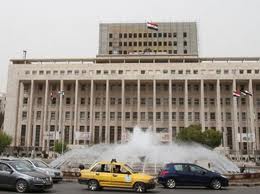 Close to 100 billion Syrian pounds (Dh6.41bn), almost a third of all funds on deposit, has left the Syrian banking system since the conflict began last year, The National can reveal.
Close to 100 billion Syrian pounds (Dh6.41bn), almost a third of all funds on deposit, has left the Syrian banking system since the conflict began last year, The National can reveal.
“We are in the danger zone, but it could get much worse,” said an official at the country’s stock-market in Damascus. “The crisis in Syria is very similar to that in Egypt, although it is a much smaller economy,” added the official, who asked to remain nameless for fear of reprisals from the regime of Bashar Al Assad, the president.
According to the latest financial accounts from Syria’s 14 listed banks, 95.6bn pounds has left the country’s crippled banking system in the past year – 27.6 per cent of all funds on deposit. At the end of 2010 the banks had 442bn pounds on deposit. A year later that total had diminished to 346.4bn.
Most of the funds are believed to have left the country destined for banks around the Gulf region and in Europe.
The latest third-quarter financial statements show the customer base for Lebanon’s Bank Audi subsidiary declined to 56.5bn pounds, compared with 82.1bn pounds for the same period a year earlier. Banque Bemo Saudi Fransisuffered a 44 per cent decline in its book as depositors started withdrawing money from their bank accounts and smuggling it to overseas banks in Lebanon and the wider Gulf region. Bank of Syria and Overseas has suffered a 33.6 per cent drop in customer deposits.
Syria’s benchmark Damascus Securities Exchange General Index, which comprises mostly banks and insurance companies, lost 50 per cent of its value last year to 863.37 points. The Egyptian Exchange, which closed for three weeks during the height of the Arab Spring, plunged 45 per cent last year.
“A closure of the [Syrian] stock market would be disastrous for the economy,” the bourse official said. The exchange has reduced its trading sessions to three days a week from five days a week prior to the unrest. The maximum price floor was lowered to 2 per cent, from 5 per cent.
“Businesses in dire need of cash who invested in the equities can’t liquidate their positions, because there is no market for it, and the currency puts them at a double loss,” said “Abdul” the chief executive of a firm in Syria’s once-thriving services sector. “The impact of the slowdown is seen in the layoffs taking place in major manufacturers and industrial companies and many high-profile business entities have defaulted already.”
The country’s economic output fell by 3.6 per cent last year, according to IHS Global Insight. It expects the economy to rebound by only 1.5 per cent this year.
The government’s response to the unrest by rolling back recently planned fiscal reforms may also be creating problems for the economy, said IHS. Since last year, Mr Al Assad has pushed through income tax cuts, fuel subsidy increases for public sector workers and a 50 per cent rise in the minimum wage to try to quell unrest.
“These measures mark a stark U-turn from recent years of reform and will serve to increase domestic inflationary pressures, significantly increase the fiscal deficit and discourage job growth,” IHS analysts wrote in a report released last week.
Syria’s 14 private lenders, considered the crown jewels of Mr Al Assad’s economic modernisation plan, are also struggling with a mismatch of assets and liabilities following a 50 per cent decline in the value for the country’s currency last year amid a violent crackdown spurred by civil unrest.
A US dollar is now worth 57.3pounds, compared with 47 pounds before the unrest began in March last year, according to the official rate. But the black-market puts the dollar at 71 liras, the Syrian term for the pound, according to exchange dealers. Foreign exchange reserves have fallen from US$19.5bn (Dh71.62bn) before the unrest to less than $14bn at the end of last year.
Sanctions imposed by the Arab League, Turkey, the EU and the US have cut Syria’s links to the global economy. The EU on Friday said it was considering extending the ban to encompass a freeze on the Syrian central bank’s assets.
The names of all people quoted in this story have been withheld for their protection.
The National

Leave a Reply
You must be logged in to post a comment.